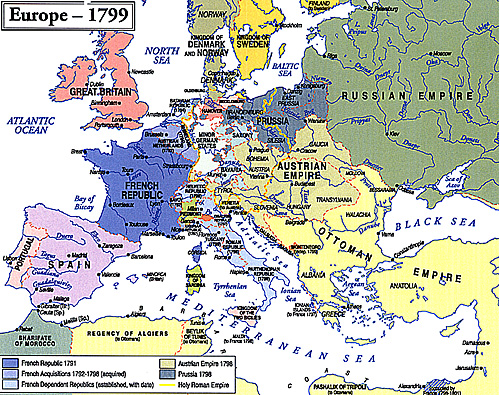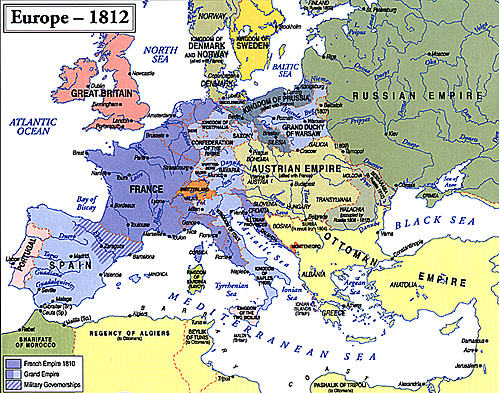Perhaps no decision has elicited more criticism from liberal historians than Napoleon's decision to "betray the Revolution" and crown himself Emperor. What motivated him?
Without question, the unresolved issue of state succession and governmental legitimacy encouraged Napoleon's enemies and hampered French diplomacy. For example, a plot by several generals to replace Bonaparte with a military dictatorship was foiled in early 1804. The most notorious of the many assassination plots against him was a bomb known as the "infernal machine" which exploded with great effect near the Tuileries at the end of 1800, killing and wounding many innocents. In retaliation for the seemingly endless royalist plots, Napoleon ordered the Duke d'Enghien to be executed, after he was seized on 21 March 1804, outside of France. This enraged royalists, but seemed to restrain further Bourbon plots to assassinate Napoleon (however, note pg. 86).
Did these assassination attempts and plots to overthrow the government motivate Napoleon to strengthen his regime and move closer to despotism? No doubt becoming "Emperor of the French" also appealed to his ambition, and his admiration for men like Alexander the Great and Charle-magne inspired him to emulation.
On 18 May 1804 the French Senate proclaimed First Consul Bonaparte Emperor Napoleon I. After a plebiscite confirming it, a coronation ceremony took place on 2 December. For symbolic reasons, Napoleon took the crown from the Pope and placed it upon his own head, and then placed a crown on the head of his wife, Josephine, making her Empress. Six years later, in order to produce an heir, Josephine was supplated by Marie-Louise, a princess of Austria. Napoleon's reign would last only ten years. He was ultimately forced to abdicate his throne in 1814 after unsuccessfully fighting the armies of Britain, Austria, Russia, Prussia, Spain, and Sweden known as the Sixth Coalition. After a brief attempt to regain control of France, known as the Hundred Days, Napoleon was defeated at Waterloo and went into final exile in 1815.
Napoleon Governs an Empire
The map shows Europe when Napoleon seized control of France at the end of 1799. By 1812, on the eve of his invasion of Russia (see map opposite page), he had built an empire through military conquest that was larger than anything seen since ancient Rome. It is amazing that Napoleon could manage such a vast territory before the advent of electronic communications.
Napoleon Bonaparte is arguably the greatest chief executive who ever lived, and his grueling fifteen-hour workdays remain a marvel. Typically arising at 2:00 in the morning, he would work in his private office until 5:00, take two hours more sleep, then work from 8:00 AM to 6:00 PM. A prodigious correspondent, Napoleon could wear out several different secretaries trying to keep up with him as he dictated fifty to a hundred letters and proclamations a day.

Jumbo Map (extremely slow: 474K)

More Napoleon: Introductory Guide
-
Introduction
Prejudice and Pride
Napoleon in Military School
The Young Artillerist's Double Life
Revolution & Opportunity
Women's Fashion During the Revolution
The Siege of Toulon
Napoleon & Josephine
Women's Fashion during the Directory
Fame & Glory: Italy
Fame & Glory: Egypt
Saviour or Usurper
Battle of Marengo
Civil Achievments
Enlightened Despot or Tyrant
Napoleon's Siblings
The Dawn of Gastronomy
Haydn and Beethoven
Women's Fashion during the Empire
Napoleon's Other Women
The Mashalate and Imperial Eagle
History's Greatest General?
Back to Table of Contents -- Napoleon #17
Back to Napoleon List of Issues
Back to MagWeb Master Magazine List
© Copyright 2001 by Napoleon LLC.
This article appears in MagWeb (Magazine Web) on the Internet World Wide Web.
The full text and graphics from other military history magazines and gaming magazines are available at http://www.magweb.com
Order Napoleon magazine direct